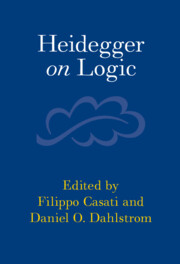Book contents
- Heidegger on Logic
- Heidegger on Logic
- Copyright page
- Contents
- Contributors
- Acknowledgments
- Method of Citation
- Introduction
- Part I Normativity, the Phenomenology of Assertions, and Productive Logic
- Part II Language, Logic, and Nonsense
- Part III Paradox, the Prospects for Ontology, and Beyond
- Chapter 7 Heidegger, Being, and All That Is and Is So
- Chapter 8 Logic and Attunement
- Chapter 9 Heidegger and the Authority of Logic
- Chapter 10 On the Limits and Possibilities of Human Thinking
- Part IV Logical Principles and the Question of Being
- References
- Index
Chapter 9 - Heidegger and the Authority of Logic
from Part III - Paradox, the Prospects for Ontology, and Beyond
Published online by Cambridge University Press: 15 September 2022
- Heidegger on Logic
- Heidegger on Logic
- Copyright page
- Contents
- Contributors
- Acknowledgments
- Method of Citation
- Introduction
- Part I Normativity, the Phenomenology of Assertions, and Productive Logic
- Part II Language, Logic, and Nonsense
- Part III Paradox, the Prospects for Ontology, and Beyond
- Chapter 7 Heidegger, Being, and All That Is and Is So
- Chapter 8 Logic and Attunement
- Chapter 9 Heidegger and the Authority of Logic
- Chapter 10 On the Limits and Possibilities of Human Thinking
- Part IV Logical Principles and the Question of Being
- References
- Index
Summary
This chapter explores Heidegger’s challenge to the claim that logic is authorative in the following sense: Putative logical propositions demand assent and serve to constrain our thinking about nonlogical subject areas such as metaphysics, and they do so because these logical truths are true in virtue of the essence of the logical. The chapter argues that, given Heidegger's metaphysics, his rejection of the authority of logic so construed is defensible. Specifically, it discusses how his nonpropositional theory of the fundamental bearers of truth and his ontological pluralism undercut this construal of the authority of logic. On this view, Heidegger is less interested in revising or rejecting principles such as the law of noncontradiction than he is in defending his right to revise or reject these principles if his metaphysical investigations demand that he does so.
Keywords
- Type
- Chapter
- Information
- Heidegger on Logic , pp. 182 - 200Publisher: Cambridge University PressPrint publication year: 2022

